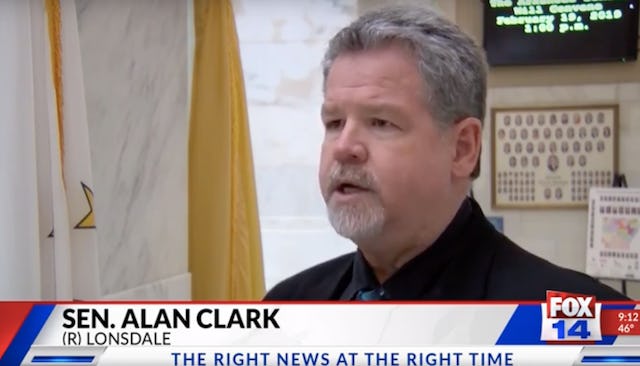Lawmaker Wants To Cut Lunch Funding For Schools That Struggle Academically

The proposed bill basically seeks to withhold lunches from students who struggle to read
In news so backward it’ll make your head spin (and then your blood boil), a lawmaker in Arkansas has proposed a bill that seeks to cut funding for lunch programs at schools that struggle academically. How on earth could anyone think the solution to improving literacy would be to take free lunches away from the children who benefit from them?
Representative Alan Clark recently proposed the bill, which, if passed, would significantly cut funding from a district’s “national school lunch funding” if the school is lagging behind in reading.
Parents in Arkansas are understandably worried about what the bill would mean for their children, should it become a law. “I don’t understand, and hopefully that bill won’t get passed in Arkansas,” one mom, Laquita Chalmers, tells WTKR News.
She has four children and says one of them has endured some recent trouble with reading. She’s confused about how cutting lunch funding could solve the literacy struggles of certain school districts.”I don’t see any connection in that,” she says.
She’s not the only one. When news of the bill became public, many people took to social media to share their disbelief that anyone could think taking food away from children who rely on it could possibly be a solution to improving their education.
For many children who come from low-income families, school-provided meals are a major source of nutrition. To deprive any school district of the funding necessary to provide free or low-cost lunches to children who need and rely on them is not only unspeakably cruel, but could have a detrimental effect on their educational performance.
According to the National Education Association, missing meals and experiencing hunger impairs a child’s development and achievement. Studies have shown the negative effects of hunger on children’s academic performance and behavior in school. Hungry children have lower test scores. They are also are more likely to repeat a grade, come to school late, or miss it entirely.
Rep. Clark issued a statement to WTKR News earlier this week, which makes about as much sense as his bill proposal.
“I am not new to controversy,” he writes. “You don’t get anything important done without confrontation and taking a few knocks. Seeing that Arkansas children can read is worth a few bruises.”
While literacy is absolutely imperative in any child’s life and education, being able to achieve better reading scores should never come at the expense of empty bellies. Rep. Clark’s statement avoids addressing his desire to cut lunch funding, but rather focuses on his longterm “business” plan for improving reading proficiency in the state.
“My bill would require that a school district improve their reading proficiency by .0001 every 2 years,” he says. “In most businesses I would be laughed at for suggesting such a small goal. But sadly many educators act like I have asked them to storm the beaches at Normandy.”
No, sir, your constituents and educators across the state likely just hope the politicians who work for them will actually work for them and their children.